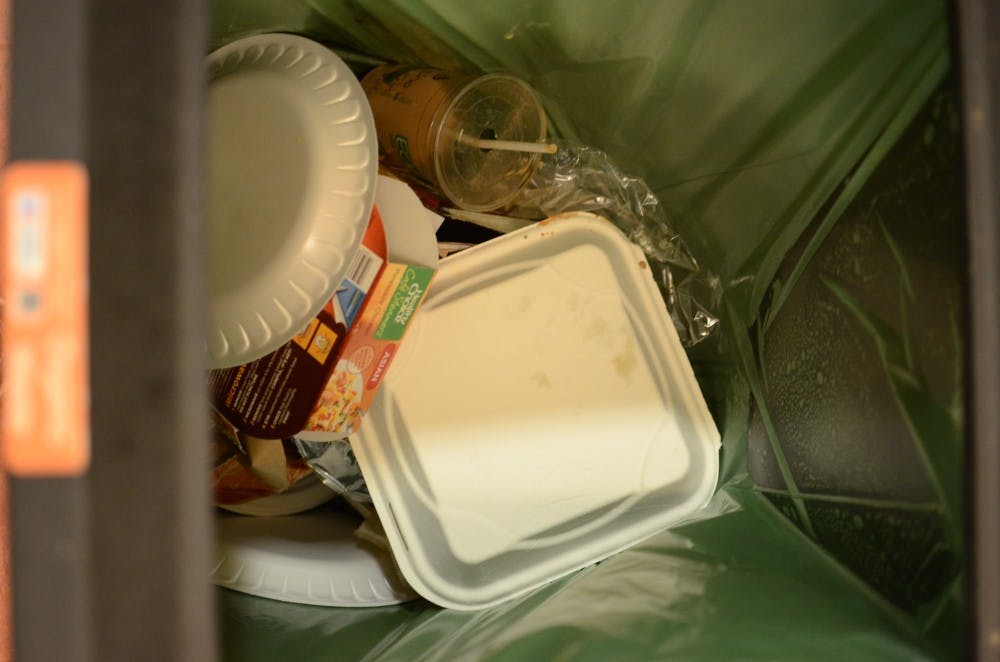AU is currently sending all of its compostable waste to landfills, due to issues with its former composting partner and contamination of the materials in compost bins.
The University’s composting program with a Prince George’s County composting facility ended in November without the possibility of immediate renewal due, according to Kelly Alexander, director of public relations at AU.
The contract was principally ended because of limited space on the site, Alexander said.
AU was notified of the end of the pilot program after it had sent multiple loads of contaminated organic waste to the facility, according to Alexander. Contamination means non-compostable material, such as plastic and metal, was at some point put into the compost bins.
The Prince George’s County facility in Maryland is the only remaining composting site accepting organic material from the D.C. area. Currently, almost half of the University’s total waste is made up of organic waste, Alexander said. Organic waste is anything that was once alive as either a plant or an animal, including food, Subway wrappers, napkins and many other items regularly consumed by students.
“Currently PG county is very limited on the amount of organics they are able to process and are now at capacity,” Alexander said in an email.
AU previously used composter Recycle Green, but were forced to change facilities after the company stopped accepting food waste in 2012, The Eagle previously reported.
After that, AU sent compost to The Peninsula Compost Group, a larger composting facility in Delaware, but it closed in October because the community deemed it too smelly, according to an article published on Delaware Online.
“The closing of this second site is a real dilemma for AU as well as all D.C. area facilities with the desire to compost organics,” Alexander said in an email. “Our contractor as well as AU's Facility Operations staff continue to look for alternative sites.”
As AU searches for an alternate composting site and sends its current compost to landfills, Alexander said it is important that AU reduces contamination levels so it will not face this problem again.
What can be composted?
Any organic material can be compos- ted. This means that if the material was once alive as an animal or plant, it will decompose.
Compostable materials include:
• Any food matter
• Wood, like toothpicks or coffee
stirrers
• Paper products like napkins
and paper towels
• Biodegradable cups and dishes
• Soiled cardboard that cannot
be recycled
Curbing contamination is critical because few facilities in the area compost commercially, according to Alexander. Furthermore, on-site composting at AU would not be feasible because of city zoning regulations and limited space.
“Hopefully we are able to go back to PG County if they are granted expansion rights,” Alexander said by email.
AU is working to reduce contamination by educating Aramark food-service and housekeeping staff, Alexander said by email. Helen Lee, the zero waste coordinator and a translator for non-english-speaking employees, gives staff visual and verbal instruction twice a year. Staff are also given procedural reminders in weekly meetings.
Aramark staff and the University’s Grounds and Recycling Associates are responsible for collecting and transporting waste, which includes the recycling, compost and trash bins, according to Donald MacIntire, the director of housekeeping for Aramark at AU.
“None of our employees are tasked with sorting through compost bags [or] bins in this process,” MacIntire said in an email.
The University is also creating community outreach programs to educate the AU community on the importance of composting and the consequences of contamination, according to Alexander.
AU launched the #WhyWeCompostAU campaign in October, the Eagle previously reported, and partnered with student groups to host events such as “Trash the Tavern,” where students learned to sort different types of waste. The University also organized a field trip to the Prince George’s County composting facility, according to Alexander.
The University hosted a Metro D.C. Zero Waste meeting in December, where other universities’ waste coordinators and representatives of Department of Energy and Department of General Services discussed the state of organics and methods of reducing contamination, Alexander said.
Facilities, the Office of Sustainability and Athletics also partnered to host a sustainability-themed basketball night at the Men’s Basketball game against Loyola, Maryland on Feb. 4, Alexander said by email.
AU’s zero waste initiatives ultimately rely on the participation of all AU students, according to Alexander.
“For zero waste to be possible, every single person on campus must participate by sorting waste correctly in the containers,” Alexander said in an email.





